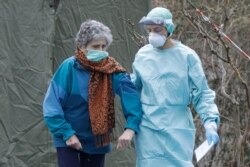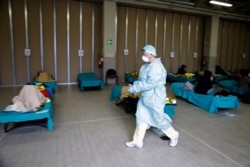Parisians marked dusk on the first day of their coronavirus lockdown this week by stepping out on their balconies and throwing open their windows to cheer and applaud the front-line fighting of doctors and nurses of the virulent viral enemy that has upended life around the world.
In neighboring Italy and Spain, health workers also received people’s praises — not only in appreciation of their dedication but to lift the spirits of the exhausted professionals who are showing true grit. They need all the morale boosts they can get.
They also need more protective gear.
In Italy and Spain, protective gear is running out. Nearly 3,000 Italian doctors have fallen sick because of COVID-19.
In Britain, doctors are angry about the lack of testing of health professionals.
“We must stop the ridiculous imbalance where politicians and sports stars can apparently get tested, but frontline health workers cannot. The criteria must be consistent,” anesthetist Chris Gough tweeted Tuesday.
British doctors have been told that even if they are sick, they will need to carry on working.
Italian doctors and nurses say they are burned out from their round-the-clock battle with coronavirus and the high volume of severely ill patients they are trying to save. Choosing which patients to hook up to scarce ventilators is having a heavy emotional and psychological toll on them.
“Since there is, unfortunately, a disproportion between hospital resources, resuscitation beds and critically ill patients, not everyone can be intubated,” according to Christian Salaroli, an anesthetist in the northern city of Bergamo, Italy, one of the areas hardest hit by the coronavirus.
Salaroli’s clinic, Papa Giovanni XXIII hospital, announced midweek that all of its 80 critical care beds were full. He told reporters that medical staff decided to treat “based on age and state of health,” and had to prioritize patients with the best chances of survival.
Doctors, Salaroli said, were being forced to declare “a terrible sentence” — one that goes against their ethics. But he added, “We are not in a position to try for miracles. It is a reality.”
Medical staff have been reduced to tears having to make so many life or death decisions in quick succession. In the smaller hospitals in close-knit communities, they often had to deny treatment to neighbors and friends.
On his Facebook page, Daniele Macchini, a physician at Humanitas Gavazzeni hospital in Bergamo, wrote, “The war has literally exploded, and the battles are uninterrupted day and night. The results of the swabs now come one after the other: positive, positive, positive. Suddenly the emergency room is collapsing.”
This week, an exhausted nurse, 40-year-old Elena Pagliarini, was photographed slumped over a computer keyboard in the city of Cremona, snatching a five-minute break.
“I hadn’t finished my shift yet when the photo was taken," she told reporters. “It was just before 6 a.m., and I was absolutely shattered. I had another hour to go before I finished, and I just collapsed. That night had been really tough, but we are all working together. If we manage to help and save people, then it’s because we are all working together as a team.”
Mauro D’Ambrosio, a nurse working at Milan’s Fate Bene Fratelli hospital, said the medical staff had to decide on giving beds to “someone who has more chances to survive.” He said it was “ethically hard to accept,” but that they had no choice. COVID-19 sufferers, he said, were spending more than 15 days in intensive care, much longer than the average five to six days for other patients.
Another nurse working in a hospital in Lombardy, the Italian region worst stricken by COVID-19, told Euronews television network that the situation was “dire” and worse than what was being portrayed in the media.
“Anesthetists, despite them playing it down a little bit on the media, have to choose whom they attach to the machine for ventilation, and who they won’t,” she said.
Roberto Cosentini, a 60-year-old doctor, told Italy’s La Repubblica newspaper that his hospital was receiving 60- to 80 infected people daily.
“If this new wave does not subside, the health system is heading towards collapse, triggered by what we can compare to a natural catastrophe,” he said.
Many of the doctors and nurses sleep at the hospital and avoid going home for fear of inadvertently infecting their families.
A surgeon at Treviglio hospital in Bergamo told Corriere della Sera newspaper that she goes home occasionally for a few hours but has shorn off her long blond hair for fear that some virus may be on it. She said she phones her partner ahead of time when planning a visit.
“I go to the bathroom, throw everything into the wash, stand in the shower for 40 minutes, rub with soap and water. Then I put on a mask, and I keep my children at a distance,” she said.
Images of the sick and dying stay with her when trying to snatch some rest at home. She explained the limited physical contact with severely sick patients — the few times they get touched are when doctors try to resuscitate them, and when they are hooked up to tubes.
And even when patients are dying, their families must be kept away.
“The patient knows what's going on, you read it in their eyes,” the surgeon said.
She said the dying ask doctors to tell their loved ones they love them. One old man asked her to send his greetings to a newborn granddaughter he will never see.






